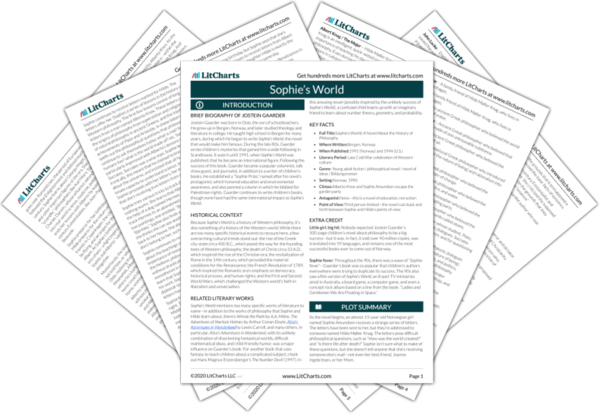Summary
Analysis
Alberto and Sophie are still in Alberto’s apartment. They stare out the window and see an airplane pulling a banner across the sky. The banner says, “HAPPY BIRTHDAY, HILDE!” Alberto mutters, “Gate-crasher.”
Alberto grows increasingly frustrated with the man who seems to be his “double”: Albert Knag. Knag, for his part, keeps getting more extravagant in his intrusions into Sophie’s world.
Themes
Alberto moves on to discuss George Berkeley with Sophie. Berkeley was an Irish bishop and philosopher. He was an empiricist, and concluded that we can’t know anything more of the world than what we perceive. Like Locke, Berkeley questioned the objectivity of our sensory impressions of the world—he questioned whether the sky was “truly” blue, or apples were “truly” red.” Berkeley went even further than Locke, saying that none of our sensory impressions of the world can be considered objective.
The fact that we’ve finally gotten to George Berkeley suggests that we’re about to find out about the nature of Albert Knag’s control over Sophie’s world. It’s telling that Berkeley continued Locke’s questioning of sensation and experience—just as Sophie has been questioning the reality of her world, so too did Berkeley question the reality of the material world.
Themes
Berkeley was a firm believer in God, and claimed that God was the spirit that caused everything in the physical world (much like Aristotle and Aquinas). He argued that humans only exist in the mind of God—our physical bodies are just illusions, the result of our confusion about what is and isn’t real (similar to Spinoza). Moreover, Berkeley thought that time and space were illusions, too—what seems like a week to a human might not be a week to God.
Berkeley, we already knew, questioned the objectivity of time and space. In many ways, his worldview corresponds most closely to the “world” we’ve seen in this book: a world where an all-powerful god figure controls everything, where time speeds up and slows down, and where physical space often seems to be a mere illusion.
Themes
Suddenly, Sophie begins to feel odd. She thinks of all the strange things that have been happening to her lately: Hilde’s father seems to be everywhere. ThenAlbertosuddenly addresses Sophie as “Hilde,” and explains that he’s always known Sophie’s true name is Hilde. He says that Hilde’s father, the major, is a kind of God to Sophie and Alberto, and Hilde is a kind of “angel.” The physical world through which Sophie and Alberto are moving may be “real,” or it may be nothing more than paper and writing, the product of Hilde’s father’s imagination.
Here, we come to the central twist of the book—the strong possibility that Sophie and Alberto are just fictions, creature who only exist as words on a printed page, or in the mind of an author. This is, of course, literally true (they’re in the book we’re reading). Moreover, Sophie and Alberto seem locked in a struggle for freedom: like Spinoza, they knowthat they’re the prisoners of Fate or a “god,” yet they don’t seem to accept the fact that someone else is controlling what they do, think, and say—they’re fighting for free will.
Themes
Get the entire Sophie’s World LitChart as a printable PDF.

Albertothen tells Sophie “Happy birthday, Hilde!” and suddenly it starts to storm outside. Sophie leaves Alberto and returns to her home, running through the downpour. Sophie’s Momputs her arm around her and asks her if she’s all right, and Sophie replies, “It’s like a bad dream.”
Albert Knag seems able to control even what Alberto says and does—Sophie and Alberto’s free will may be entirely an illusion. Overall, the meta-fictional quality of the book is intended to make us, the readers, want to question the reality of our own world (just as Berkeley did). Are we really any freer or more “real” than Alberto, Sophie, or even Albert Knag?
Themes












